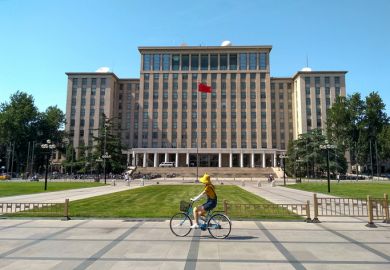A preference for hiring junior academics with overseas experience is still widely held in China, potentially depriving locally trained scholars of opportunities, a study warns.
According to an analysis of recruitment advertisements placed by 36 higher education institutions in China, 64 per cent of samples mentioned requirements relating to “overseas background”, typically referring to an overseas degree or experience of teaching and research abroad.
More privileged institutions were particularly likely to make this demand, with 83 per cent of institutions in coastal areas of eastern China listing this experience, and 92 per cent of universities managed by the Ministry of Education.
Chen Ningyang, a researcher at Soochow University and author of the study, published in Tertiary Education and Management, said that universities were involved in “fierce competition…for funding, resources, and rankings”.
“The institutions might be overwhelmed by the fear of falling behind and have their expectations raised with the general trend of talents gathering in better-resourced places,” Dr Chen said. “One informant used the Chinese idiom, ‘when the tide rises, boats float higher’ to describe this situation.”
The study points out that the requirement for international experience exists in all disciplines, even faculties focusing mainly on local concerns. To understand PhD students’ response to this, in-depth interviews were conducted with 12 informants from three universities, which detected a sense of “helplessness and disorientation”.
“It’s beyond my understanding why the university’s department of history would favour overseas returnees over domestic graduates,” said one interviewee who published seven articles in prestigious Chinese journals during her postgraduate studies and was denied an academic position at her alma mater. “They may have an advantage in doing studies in global history, but I don’t think they can do as well in researching domestic topics.”
Dr Chen writes that this case implies “a sufficient supply of returnee talents” and underlines the inequality of access to international experience for students in different subjects. Some interviewees in Chinese literature and Marxism said they did not expect to get any overseas chances, as one of them said “the policies are often in favour of natural science students”.
Previous research has suggested that returnee scholars are treated differently in terms of salary packages, funding and promotion opportunities. In response to this, the country’s education authorities have taken a series of actions to reform how universities, scholars and research are assessed.
“I think there are some changes, subtle if not remarkable ones.” Dr Chen said. “Some of the country’s leading institutions seem to have been faring well in cultivating graduates that meet the expectations of a ‘quality’ candidate – though again they are often evaluated by quantifiable productivity measures. Meanwhile, the neo-nationalist sentiment may help justify the legitimacy of hiring local candidates.”
When asked about the potential impact of the pandemic on junior academic hiring as many domestic students might lose the overseas experience, Dr Chen admitted that this was “an interesting new topic”. “I think there could be some influence, especially for employers who tend to make simplistic correlations between, say, the time spent physically being abroad and one’s ‘international’ experience,” she said.
“In all, it may take some time for a fundamental change to occur, one that shall base itself on a more mature system.”
Register to continue
Why register?
- Registration is free and only takes a moment
- Once registered, you can read 3 articles a month
- Sign up for our newsletter
Subscribe
Or subscribe for unlimited access to:
- Unlimited access to news, views, insights & reviews
- Digital editions
- Digital access to THE’s university and college rankings analysis
Already registered or a current subscriber?









